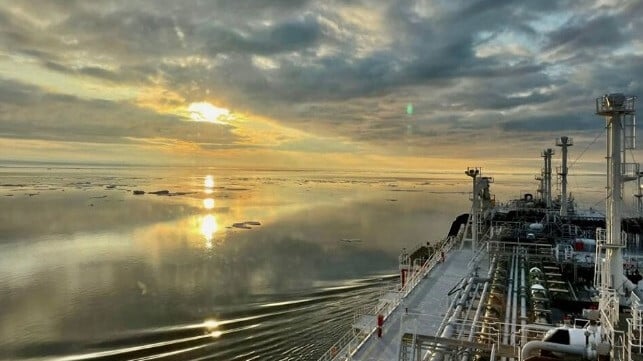Gazprom Ships its First Cargo of LNG to China Via Arctic Waters

Russian state energy giant Gazprom has shipped its first consignment of LNG to China through Russia's Arctic waters, duplicating the delivery route used by Russian natural gas producer Novatek.
In January, Gazprom opened an LNG liquefaction plant on Russia's Baltic coast, about 100 miles to the northwest of St. Petersburg. The new Portovaya LNG plant was completed without the help of German industrial partner Linde, which withdrew last year because of EU sanctions. It takes off gas from the Portovaya compressor station, which was originally installed to serve the now-defunct Nord Stream pipeline system.
The LNG plant started up last September and has been shipping regular cargoes on conventional routes. In August, the LNG carrier Velikiy Novgorod took on a cargo at Portovaya and headed north for the Barents Sea, not south for Europe. The ice class vessel completed its NSR transit uneventfully and has arrived at the Tangshan LNG import terminal in Hebei Province, China, Gazprom announced Monday.
Velikiy Novgorod was built with the icy winter waters of the Baltic in mind. She is classed Ice2, roughly equivalent to Lloyd's 1C - ice-classed, but less capable than the Arc7 icebreaking LNG carriers designed to operate unescorted on the Northern Sea Route.

that matters most
Get the latest maritime news delivered to your inbox daily.
In the Northern Sea Route's frigid eastern stretch, wintertime transits require a heavy icebreaker escort to clear the way. In summer, the ice recedes, allowing a limited amount of merchant traffic to pass. This year, the extent of ice cover has been unusually small, and Russian shipping interests have set multiple firsts on the route. A standard Capesize bulker recently transited the NSR for the very first time, followed by the first transit for a non-ice-class Aframax tanker. (The tanker transit may be ill-advised due to the risk of a spill, according to some Western observers, but it has been approved by the authorities.)
Russian President Vladimir Putin has put a high priority on increasing traffic on Russia's Northern Sea Route (NSR), including development of year-round navigation. At present, the route handles about 35 million tonnes of cargo a year; Putin would like to increase that to 200 million tonnes by 2031.
